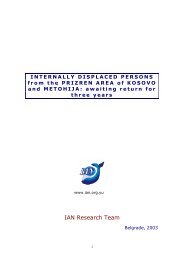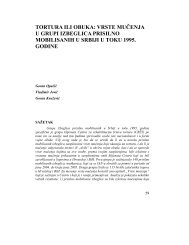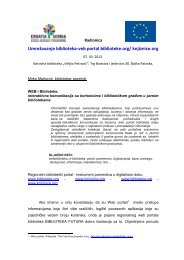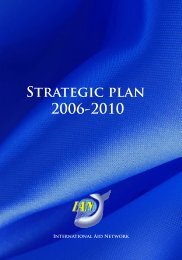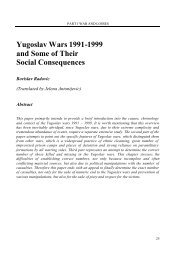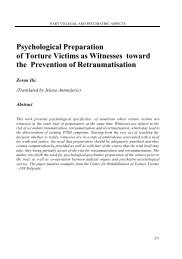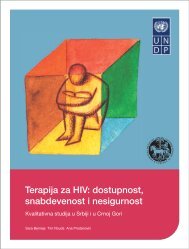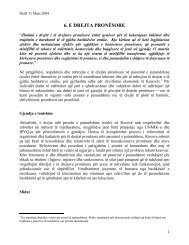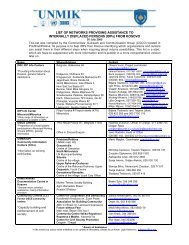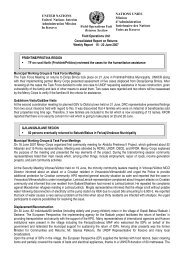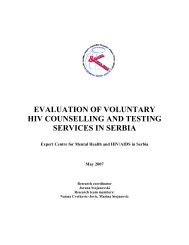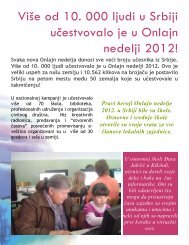educational department - IAN-a
educational department - IAN-a
educational department - IAN-a
Create successful ePaper yourself
Turn your PDF publications into a flip-book with our unique Google optimized e-Paper software.
<strong>IAN</strong> ANNUAL REPORT 2010<br />
Content:<br />
INTRODUCTION LETTER 3<br />
HEALTH 4<br />
CENTER FOR REHABILITATION OF TORTURE VICTIMS 5<br />
MENTAL HEALTH 8<br />
HIV/AIDS 10<br />
EDUCATION 16<br />
HUMAN RIGHTS 22<br />
RESEARCH 24<br />
SOURCES OF FUNDING 28<br />
International Aid Network, <strong>IAN</strong> (www.ian.org.rs), is a local non-governmental<br />
humanitarian organization active since 1997 in the field of mental health<br />
promotion, as well as in cross-border human rights protection through provision<br />
of psychological, medical, <strong>educational</strong>, legal and informational assistance to<br />
torture survivors and their family members, PLHIV, persons with disabilites,<br />
people with mental health problems, refugees, women, internally displaced<br />
persons and other vulnerable persons in Serbia. <strong>IAN</strong> has four Programme<br />
Departments: Health (Including Center for Rehabilitation of Torture Victims,<br />
Mental health and HIV/AIDS sectors), Human Rights, Research and Educational<br />
Department.<br />
2<br />
www.ian.org.rs
Introduction letter<br />
At the end of 2010 International Aid Network, as a local civil society organization, has<br />
celebrated 13 years of its work in Serbia and beyond, especially in the region of Eastern<br />
BiH.<br />
Last year was marked on one hand with significant improvement and continuation of traditional<br />
and existing <strong>IAN</strong> programmes, and on the other hand it was marked with the great changes in<br />
terms of the adoption and application of the new Statute, initiated in February 2010 at the <strong>IAN</strong><br />
Parliamentary Seession.<br />
Beginning of 2010 was the period of implementing the new <strong>IAN</strong> management team and the<br />
implementation of reforms, which were prepared in consultations during and especially at the<br />
end of 2009. International Aid Network met three big challenges at the beginning of 2010.<br />
First one was the need to reorganize work in <strong>IAN</strong>. The need to change the way <strong>IAN</strong> worked was facilitated<br />
additionally by change in Law on non-governmental organizations and the need to adapt the Statute<br />
and general legal acts of the organization to the new modus of monitoring the work of civil society<br />
organizations in Serbia.<br />
Second, according to data provided by financial and administrative service it was significantly important<br />
to decrease <strong>IAN</strong> costs and introduce changes in financing general operational costs of organization and<br />
create conditions to secure financial stability of <strong>IAN</strong>.<br />
Third, changes in the requirements for project proposals, number and the type of donors to whom we<br />
traditionally applied for financial support for our projects, as weel as the need to create new and set<br />
forward the old partnerships.<br />
These challenges we met the following way:<br />
• Through democratic process of expansion of the <strong>IAN</strong> Parliament, which grew in number with 18<br />
new members (employed and expert cooperates), and consequently has chosen new bodies within<br />
<strong>IAN</strong>- President of the parliament, President of organization, members of the Steering Committee<br />
and Superior council.<br />
• With efforts and support of all <strong>IAN</strong> Parliament members, we have managed to regain financial and<br />
operative sustainability of <strong>IAN</strong>.<br />
• We have successfully complied with the new demands of our strategic donors, built up new<br />
partnerships and good relations with our cooperates and procured larger amount of assets needed<br />
for minimum standards of <strong>IAN</strong> functioning until 2013.<br />
I am glad to present you <strong>IAN</strong>’s Annual report for 2010 and hope that the way we faced the challenges as<br />
an organization, as well as the work of particular sections, will be assessed as successful.<br />
Nataša Cvetković Jović<br />
President<br />
International Aid Network<br />
www.ian.org.rs<br />
3
<strong>IAN</strong> ANNUAL REPORT 2010<br />
<strong>IAN</strong> ANNUAL REPORT 2010<br />
HEALTH<br />
DEPARTMENT<br />
4<br />
www.ian.org.rs<br />
www.ian.org.rs
CENTER FOR REHABILITATION OF TORTURE VICTIMS<br />
The main objectives of CRTV include provision of psychiatric, psychosocial, medical and<br />
legal support to victims of war-related or civil torture and their family members and<br />
other discriminated and underprivileged groups whose human rights are violated by the<br />
authorities. We aim to provide comprehensive rehabilitation and prevent further deterioration<br />
of their condition and, thus, enable them to integrate and become active members of the<br />
community.<br />
We work on prevention of torture and organized violence in our society by raising public<br />
awareness on the issues of torture and violation of human rights, as well as by advocating for<br />
establishment of independent national mechanisms for prevention of torture, what is actual<br />
obligation of the state of Serbia accepted by the ratification of the UN Convention against<br />
torture and other cruel, inhuman or degrading treatment or punishment, and by ratifying the<br />
Optional Protocol to the Convention (OPCAT) in 2006.<br />
Comprehensive Rehabilitation Program for Torture Victims in Serbia and<br />
Bosnia and Herzegovina<br />
(December 2008 – November 2011)<br />
Donors:<br />
European Commission through EIDHR<br />
United Nations Voluntary Fund for Victims of Torture<br />
Contact person:<br />
Jelena Lončarević,<br />
<strong>IAN</strong> CRTV Program Director<br />
jbakalic@ian.org.rs<br />
Project description:<br />
To contribute to long-term goals in assisting torture victims in December 2008 <strong>IAN</strong> started<br />
comprehensive rehabilitation program in Serbia and Bosnia and Herzegovina. This project based<br />
on eight year long experience and expertise in assistance to torture victims in <strong>IAN</strong> Centre for<br />
Rehabilitation of Torture Victims and recognized needs for stronger cross-border work in specific<br />
areas in BiH.<br />
Two new specialised Centres for Rehabilitation of Torture Victims have been established in Milici<br />
and Trebinje within partner organizations Health Center “Sveti Nikola” Milici and General Hospital of<br />
Trebinje. <strong>IAN</strong> CRTV methodology in work, including proactive and holistic approach to beneficiaries<br />
aimed to provide them psychotherapeutic, medical, legal assistance and contribute to their psychosocial<br />
rehabilitation through <strong>educational</strong> and professional empowerment, was used to build the<br />
capacities of partners in BiH for working with torture victims and members of their families.<br />
Activities and results in 2010:<br />
Through activities of all three centers involved in the project in 2010, psychological assistance was<br />
provided to 465 clients, 277 clients got medical help, 120 received legal while 132 were involved<br />
in <strong>educational</strong> programs for psycho-social rehabilitation and professional empowerment. Through<br />
activities of <strong>IAN</strong> mobile team in Serbia and BiH, 366 clients received comprehensive assistance on<br />
the field.<br />
www.ian.org.rs<br />
5
<strong>IAN</strong> ANNUAL REPORT 2010<br />
From Project Evaluation - Feedbacks from the clients<br />
The clients recognize the Centers as open and accessible, services as available, flexible and<br />
maximum rise to meet clients’ needs. They particularly appreciate expertise in work and<br />
human contacts of the CRTV staff members with each client. Clients recognize that CRTV is<br />
overcoming the lack of available professional services in local communities, in addition to<br />
connecting people and bridging differences among the people in the region.<br />
From my group of comrades five people committed suicide, so that is why the psychological<br />
support for the people who have survived torture is extremely important. (male, age 48,<br />
Hrtkovci).<br />
There are changes in a positive way, for my self and my families, we have become calmer.<br />
(male, age 70, Trebinje)<br />
I learned to use the computer and the Internet, to write CV and everything else. Now I work<br />
on computer without assistance, I have an e-mail and I know how to search for jobs on the<br />
Internet, how to send a CV by email. I’m not humbled any more. (female, age 35, Belgrade)<br />
The human contact is very important , doctor welcomes us always with a smile. (male, age 67,<br />
Trebinje)<br />
I would never be able to gather all the papers by myself, I would not even dare to go for it, I<br />
have been really received good legal aid here. (male, 63, Hrtkovci )<br />
I like the new friendships, involvement of people of different nationalities. (female, age 24,<br />
Milici)<br />
6<br />
For the purpose of the strengthenining capacities of professionals in BiH to recognize and work with<br />
torture victims, 3 trainings were conducted for medical doctors, psychologists, nurses and social workers.<br />
Trainings were realized by <strong>IAN</strong> staff with significant experience and expertise in the area of torture and<br />
trauma. 61 participants were included in these trainings, knowledge was shared and contacts established<br />
for further collaboration.<br />
To raise awareness on torture related issues among general public and decision makers as well as to<br />
commemorate 26. June - UN International Day in Support of Victims of Torture, several public events<br />
were conducted.<br />
www.ian.org.rs<br />
International conference Global mental health: Developing values<br />
driven services and evidence based practice, was organized by <strong>IAN</strong>,<br />
International Mental Health Collaborating Network and Faculty of<br />
Philosophy (University of Belgrade) in collaboration with the Protector<br />
of Citizens of the Republic of Serbia (Ombudsman) and Caritas Italiana.<br />
The press conferences on occasion of 26 June were held in Belgrade,<br />
Trebinje and Milici. Along with Program coordinator of <strong>IAN</strong> CRTV,<br />
following distinguished speakers participated at the press conference<br />
held in Belgrade: Mr Thomas Gnocchi, representative of EU as a main<br />
project donor, Mr. Miloš Janković Deputy Ombudsman for persons<br />
deprived of their liberty, Mr. Đorđe Alempijević forensic expert, member<br />
of Ombudsman council, and Ms. Ljiljana Palibrk, representative of NGO<br />
dealing with monitoring of places of detention. All of them provided<br />
significant inputs in relation to current situation in Serbia regarding<br />
torture, EU support to the projects related to human rights protection<br />
and efforts that exist in the country as well as obligations that the state<br />
has in relation to torture prevention and rehabilitation of victims.
CENTER FOR REHABILITATION OF TORTURE VICTIMS<br />
The dance and music capoeira performance was organized on Kalemegdan fortress<br />
symbolically representing the fight against torture and its perpetrators. The concert for youth<br />
population was organized in Terbinje, while youth handball tournament was conducted<br />
in Milici, BiH. IRCT Internet game Let’s erase torture has been posted on <strong>IAN</strong> web site for<br />
educating general public about the issue of torture in an amusing way (over 700 people<br />
played the game).<br />
All public events, media appearances of <strong>IAN</strong> and partner organizations’ staff and produced<br />
and distributed educative flyers were used for informing torture survivors about availability<br />
of services aimed to their rehabilitation as well as for raising public awareness on violation of<br />
human rights and the inhuman conditions in closed institutions such as prisons, psychiatric<br />
institutions, informing the public about the most important issues related to prohibition of<br />
torture and other cruel, inhuman or degrading treatment or punishment and emphasizing<br />
obligation that State authority has in relation to ratified Optional Protocol to the Convention<br />
Against Torture (OPCAT). The OPCAT aims at establishing National Preventive Mechanism<br />
(NPM) as independent body for monitoring all places where people are deprived of their<br />
liberty, in order to prevent torture and other forms of maltreatment. Serbia still has not<br />
established the NPM although this was due three years ago and <strong>IAN</strong> used different events to remind<br />
and pressure authorities to fulfill this obligation.<br />
Torture Prevention and Rehabilitation Programme<br />
(November 2010 – October 2013)<br />
Donors:<br />
European Commission through EIDHR<br />
United Nations Voluntary Fund for Victims of Torture<br />
Contact person:<br />
Nataša Cvetković Jović<br />
Programme Director<br />
ncvetkovic@ian.org.rs<br />
Project description:<br />
At the end of 2010 <strong>IAN</strong> started a new three year project for torture prevention and rehabilitation of<br />
victims, in partnership with Global Initiative on Psychiatry (GIP), Netherlands.<br />
The project contributes to eradicating torture and impunity in Serbia and the Balkan region through<br />
provision of comprehensive rehabilitation for victims and building capacities of stakeholders<br />
to prevent and report on torture (Ombudsman office, associations of people from marginalized<br />
groups) as well as campaigning against torture and culture of violence.<br />
www.ian.org.rs<br />
7
<strong>IAN</strong> ANNUAL REPORT 2010<br />
Main aims of the <strong>IAN</strong> metal health related projects and initiatives are to establish set of<br />
activities for assessment of mental health status of groups at risk, to assess and improve<br />
the quality of care that is provided, to promote mechanisms for protection of human rights of<br />
mentally ill, to initiate programs for prevention and rehabilitation of mental health disorders<br />
and to support reforms of the mental health care system.<br />
These activities are especially targeting people residing in psychiatric hospitals (“asylums”) or<br />
institutions of social protection.<br />
Development of Integrated Mental Health and Social Care Services for a<br />
Model Region<br />
Donor:<br />
Duch Ministry of Foreign Affairs<br />
Contact person:<br />
Nataša Cvetković Jović<br />
Project Manager<br />
ncvetkovic@ian.org.rs<br />
Project description:<br />
Project has been implemented since 2007. in collaboration with Global Initiative in Psychiatry (GIP),<br />
nongovernmental organization from the Netherlands and with support of Ministry of Health and<br />
Ministry of Labor, Employment and Social Affairs of Republic of Serbia. Principal associate on the project<br />
is Community Mental Health Centre “Medijana“from Nis, the first centre of the kind in Serbia, established<br />
and developed through the project of Stability Pact. Other associates on the project are Special Psychiatric<br />
Hospital “Gornja Toponica” and Clinic for Mental Health within Clinical Center Nis, Psychiatric Department<br />
of General Hospital in Leskovac and Psychiatric Department of General Hospital in Vranje. The project<br />
goal is to create a functional regional network of accessible community mental health and social care<br />
services in the community of Southern Serbia, as a model for the rest of the country, that supports the<br />
integration of people with mental illness into society, and increases the involvement of users of mental<br />
health services and their relatives in the service delivery. Main activities for achieving the project goal are:<br />
improvement of pilot center Medijana as a model for establishment of new CMH services, development of<br />
training programs for education of professionals for new CMH centers, establishment of protected living<br />
homes, establishment of mechanisms for client involvement, establishment of Standing Committee on<br />
Equal Rights for Clients and Standing Committee on Inter-sectorial Collaboration.<br />
Results in 2010:<br />
2010 as the last project year could be described in terms of slow recovery and reconstruction of a part of<br />
projects activities after a difficult period that culminated during 2009. Replacement of reform oriented<br />
director of SPH “Gornja Toponica“ and Center “Medijana“, division among the staff caused by this<br />
replacement, delay in bringing necessary laws for continuation of reforms of mental health protection<br />
system and poor cooperation between health and social sectors, disabled implementation improvement<br />
of certain activities, especially protected living and establishment of new CMH centers. Although, support<br />
of partner organization during 2010. was mostly dedicated to promotion of protected living, the greatest<br />
improvement was done in involving patients in services organization and work of Patients Council in SPH<br />
“Gornja Toponica“. During the year, the Council had been working on improving living conditions in the<br />
hospital (better food, more lockers, compensation, etc), establishing communication with management<br />
of the hospital and other authorities. It was continued with support to work of patient’s organizations<br />
“Dusa” and “Valenca”. Center Medijana was working on promotion of community mental health through<br />
8<br />
www.ian.org.rs
MENTAL HEALTH<br />
campaigns and public events (Campaign“To be same and to be different”, public distribution<br />
of diplomas for courses attendants) and upgrading its capacities through experience<br />
exchange with CMHC from Blagoevgrad (Bulgaria). As information and resource center, it<br />
developed two training modules designed for potential CMHS providers: „Basis of Community<br />
Mental Health Care” and „Basis of Psychosocial Rehabilitation” that were organized for staff<br />
of General hospitals in Vranje, Leskovac and Nis. The Center had also managed working<br />
group that made Expert Methodology Manual for establishment of CMHC. During 2010. two<br />
more trainings for Pacient Advocates had been carried out, with aim to manage uniformity<br />
of registration complaints of patients in institutions and exchange of working experiences.<br />
Psychosocial rehabilitation in Medijana was continued through work of Telecenter and<br />
organising courses of computers and social skills for 274 participants. Within the project<br />
Standing committee on equal rights for clients had its regular meetings. Committee kept<br />
the contact with Pacient Council of SPH “Gornja Toponica”, reported about relation between<br />
hospital management and Council and actively participated in organization of international<br />
conference on mental health.<br />
One of the most important activities that<br />
section had carried out within the project was<br />
organization of international conference: Global<br />
Mental Health – Developing Values Driven Services<br />
and Evidence Based Practice. Conference was<br />
held from 20th to 22nd May and was organized<br />
by <strong>IAN</strong> International Aid Network, International<br />
Mental Health Collaborating Network (IMHCN)<br />
and Faculty of Philosophy, University of Belgrade,<br />
in collaboration with Protector of Citizens of<br />
Republic of Serbia and Caritas Italiana, supported<br />
by European Union, Dutch ministry of Foreign<br />
Affairs, Ministry of Science and Technological<br />
Development and Ministry of Health of Republic<br />
of Serbia. The aim of conference was to conect our<br />
country (experts, patients, families and citizens)<br />
with regions and states of Europe and world that<br />
had successful practice in developing CMHC and<br />
contribute to the quality of mental health care and<br />
full enjoyment of human rights of all citizens. Three<br />
day conference gathered 133 eminent experts<br />
from universities and institutions across Europe<br />
(Italy, Great Britain, France, Sweden, Holland) and<br />
region (Bulgaria, Bosnia and Herzegovina, Macedonia, Albania), representatives of WHO, European<br />
Parliament, institutions and organisations concerned about human rights: Ombudsman’s office,<br />
Ministry of Justice and NGOs from Europe and Serbia dealing with users of psychiatric services and/<br />
or human rights. Conference put down lots of emphasis on inhuman, degrading treatment and<br />
torture in psychiatric hospitals and other closed institutions with full participation of the <strong>IAN</strong> torture<br />
rehabilitation team as indicated earlier in the report. General assessment of the conference was<br />
4.71.<br />
www.ian.org.rs<br />
9
<strong>IAN</strong> ANNUAL REPORT 2010<br />
Activities in domain of HIV being carried out in Serbia are part of national project of<br />
Republic of Serbia financed by Global Fund to Fight AIDS, Tuberculosis and Malaria. Since<br />
its establishment 2002 Global Fund has become major source of financing programs to fight<br />
aids, tuberculosis and malaria, in Serbia, till today, through the 1st, 6th and 8th rounds for aids<br />
and the 3rd round for tuberculosis has given grant in maximum amount of 36.689.919$. During<br />
2010 in Serbia the 6th and 8th rounds of Global Fund were concurrently carried out: in October<br />
2006 started realization of the 6th round of five year project „Improving national response<br />
to HIV by decentralization of the key health institutions“, whose primary recipient is Ministry<br />
of Health of Republic of Serbia and within the 8th round Serbia got funds for implementing<br />
national program „Strehtening HIV prevention and support to group vulnerable to HIV” whose<br />
primary recipients are Youth of JAZAS for NGO sector and Ministry of Health of Republic of<br />
Serbia for government institutions. Both projects have been carried out in cooperation with<br />
government and nongovernmental sector, private sector and people living with HIV, through<br />
public announcements and contests for projects. Within the 6th and 8th rounds of Global<br />
Fund, <strong>IAN</strong> carried out several projects.<br />
Perception of Knowledge, Attitudes and Behavior of Health Care Workers in Serbia,<br />
Concerning HIV<br />
Donors:<br />
Ministry of Health of Republic of Serbia through<br />
the 6th round of Global Fund project<br />
Contact person:<br />
Violeta Anđelković<br />
Project Manager<br />
vandjelkovic@ian.org.rs<br />
Project description:<br />
The project included conducting research about perception of knowledge, attitudes and behaviors of<br />
health care workers in Serbia concerning HIV and AIDS and publication of the results. The project goal<br />
was gathering information about health care workers` knowledge about HIV, what attitudes they have<br />
towards the people living with HIV and how they behave on their jobs in context of HIV infection, and<br />
later on, obtaining relevant results, preparation of adequate education programs for health care workers<br />
and anti-stigma campaign.<br />
10<br />
Results in 2010:<br />
Project activities were divided in three phases: the first phase included gathering of research team,<br />
creating research draft and realization plan, the second phase implied preparation of research, creating<br />
instrument, gathering and education of interviewers and field research, the last phase referred to writing<br />
report and publication of results. Multidisciplinary team including infectologist, epidemiologist, social<br />
psychologist, andragogist and methodologist, experts from Faculties of Medicine and Philosophy,<br />
together with representatives of Ministry of Health, created Questionnaire for the needs of research.<br />
Besides general demographic data, the Questionnaire consisted of three parts: test of knowledge,<br />
scale of attitudes and a part about behavior at work in context of HIV infection. After devising a plan of<br />
field research, monitoring and evaluation, team of interviewers consisting of educated psychologists<br />
www.ian.org.rs
HIV / AIDS<br />
and students of psychology and medicine, carried out field research on representative<br />
sample including 1502 health care workers. Sample was stratified concerning gender, age,<br />
education and health care level. Collected data were processed and in accordance with<br />
them a report with recommendations for education program for health care workers was<br />
written for the donor (Ministry of Health of Republic of Serbia). The report, together with<br />
bio-behavioral study among population at increased risk from HIV and people living with<br />
HIV, was presented at a public meeting with over 70 invitees, experts in various fields from<br />
all sectors of society, government and nongovernmental sector, private sector, people living<br />
with HIV, representatives of Ministry of Health and Ministry of Social Politics, Health Council<br />
and Chamber of medical doctors of Serbia. The report was published in Serbian and can be<br />
downloaded from the page http://www.ian.org.rs/sida/publikacije.htm. The research findings<br />
were used for creating educative training for health care workers „Health care workers and<br />
HIV – standard precaution and good practice in HIV treatment and prevention“.<br />
Health Care Workers and HIV – Standard Precaution and Good Practice in<br />
HIV Treatment and Prevention<br />
Donors:<br />
Ministry of Health of Republic of Serbia<br />
through the 8th round of Global Fund project<br />
Contact person:<br />
Violeta Anđelković<br />
Project Manager<br />
vandjelkovic@ian.org.rs<br />
Project description:<br />
The aim of education was to increase knowledge of health care workers required for improving<br />
care and treatment of people living with HIV. Training program, methodology and subjects were<br />
based on results of research in connection with knowledge, attitudes and behavior of health care<br />
workers that <strong>IAN</strong> carried out at a beginning of the year. Regarding these results it was planned that<br />
trainings should be carried out by 9 training teams, each consisting of 3 members: doctor specialist,<br />
responsible for quality of information given on training, psychologist, social worker or doctor with<br />
experience in workshops and exercises demanding personal engagement and using experience for<br />
learning and attitudes change and person living with HIV, who should share his or her experience<br />
and problems that people living with HIV must deal with. All members of the team have been<br />
dealing with HIV, in one way or another, for many years and have experience in educating health<br />
care workers. Method of selection of participants allowed that health care workers with different<br />
education and doing different jobs went through education.<br />
Results in 2010:<br />
Through two cycles of education in cooperation with teams of trainers, 20 trainings have been<br />
carried out for 496 health care workers of different profiles (specialists, nurses, laborants etc.) from<br />
primary, secondary and terciary health care institutions all over Serbia. 16 trainings were organized<br />
for 417 health care workers in the period May-June 2010. in 10 different places in Serbia: two<br />
trainings in Belgrade, Sabac, Vranje, Zrenjanin and Nis and one training in Uzice, Sremski Karlovci,<br />
www.ian.org.rs<br />
11
<strong>IAN</strong> ANNUAL REPORT 2010<br />
Subotica, Kragujevac, Kraljevo i<br />
Cacak. Within the second cycle<br />
of education, during December,<br />
trainings in Sremska Mitrovica,<br />
Prokuplje, Bujanovac and<br />
Sombor were organized for 79<br />
participants. All trainings in<br />
general, were rated as excellent.<br />
Average mark of trainings held in<br />
May-June was 5.55 of maximum 6.<br />
Average mark of trainings held in<br />
December was 4.92 of maximum<br />
5. Examination of evaluation lists<br />
from all trainings showed that<br />
participants perceived training<br />
as useful, it helped them gain<br />
knowledge they lacked, they<br />
liked the fact that the training teams were<br />
mixed and that participants were actively<br />
included in process of learning. What they<br />
estimated as very important was presence<br />
of person living with HIV in training team.<br />
That fact helped them overcome their own<br />
fears of contact with people living with<br />
HIV and contributed to more positive and<br />
Feedbacks from participants:<br />
„During my first contact with HIV positive person, I felt<br />
some kind of discomfort, I was wondering if that was<br />
thruth, was it possible that she was HIV positive, so<br />
pretty and standing in front of us at that moment. I was<br />
delighted with her honesty and bravery, her pleasantness<br />
and her accessibity. I am very grateful that she was with<br />
us.“ (female, nurse, age 43, Vranje)<br />
„I think that my colleagues accept everything we learned.<br />
We, who were attending the course , managed to<br />
disseminate knowledge we gained to the rest of the team.<br />
I am very well accepted in my workplace after seminar<br />
and I was feeling great while sharing knowledge with my<br />
colleagues.“ (female, nurse, age 43, Vranje)<br />
„We changed the attitude, decreased stigma and<br />
discrimination that, I think, is less and less present. Now,<br />
when I remember, the first case of AIDS and the second<br />
one with HIV, when on the file with big letters was written<br />
AIDS, I am ashamed in the name of whole staff.“ (female,<br />
nurse, age 52, Vranje)<br />
more tolerant attitudes towards them. Pre and post tests of knowledge about HIV showed increase<br />
of knowledge after training: average score on pretest for 16 trainings from the first cycle was 16.1 and<br />
average score on posttest 21.2. Trainers also well understood the importance of helping participants<br />
realize their attitudes and their impact on treating people with HIV. All trainers achieved appointed goals<br />
through giving relevant and contemporary information about HIV and through interactive exchange<br />
and discussion about delicate subjects (stigma<br />
and discrimination against people living with HIV<br />
in health care institutions). Although, this training<br />
is one of many trainings about HIV organized in<br />
Serbia, trainers with experience in the subject and<br />
participants on their own think that it is unique for<br />
several reasons: 1) multidisciplinary training teams<br />
that cover a wide range of knowledge and skills; 2)<br />
presence of person living with HIV in training team<br />
and sharing of experience with participants; 3)<br />
training content, subjects and methodology were<br />
based on the results of research). For the second<br />
cycle of education, training was accredited by<br />
Health Council of Republic of Serbia.<br />
12<br />
www.ian.org.rs
HIV / AIDS<br />
Positive Prevention in VCT<br />
Donors:<br />
Ministry of Health of Republic of Serbia through the 6th round of Global Fund project<br />
Contact person:<br />
Violeta Anđelković<br />
Project Manager<br />
vandjelkovic@ian.org.rs<br />
Project description:<br />
The project included dissemination of knowledge regarding positive prevention and its use<br />
in different systems and services, through organization of two three-day trainings: “Basis of<br />
VCT and positive prevention” for counselors before and after HIV testing in Serbia. The aim of<br />
the training was to increase knowledge about VCT, principles and strategies of positive prevention<br />
and about role of VCT in positive prevention.<br />
Results in 2010:<br />
Appointed goals were achieved through organization and realization of two three-day trainings<br />
for 37 counselors from VCT center. Methodology consisted of role play, group discussion, and work<br />
in pairs and small groups, study cases and presentations. Pre and post tests of knowledge showed<br />
increase of knowledge after education (1st group pre/post test score 3.44 / 4.14; 2nd group pre/post<br />
test score 3.07/3.77). All aspects of training (relevance of the subject, material distributed, exercises,<br />
and involvement of participants, knowledge and style of trainers) and training in general were rated<br />
as excellent.<br />
Strengthening Capacity of PLHIV for Self Organization and Conducting Self Help<br />
Groups<br />
Donors:<br />
Youth of JAZAS through the 8th round of Global fund project<br />
Contact person:<br />
Violeta Anđelković<br />
Project Manager<br />
vandjelkovic@ian.org.rs<br />
Project description:<br />
The project goal was to educate and support people living with HIV in organizing and leading selfsupport<br />
groups and included two two-day trainings, before and after which, participants were<br />
supported to organize and lead self-support groups by themselves. The goal was set up as result<br />
of belief that people living with HIV could be best empowered if they would take responsibility for<br />
themselves and their HIV positive friends.<br />
www.ian.org.rs<br />
13
<strong>IAN</strong> ANNUAL REPORT 2010<br />
Results in 2010:<br />
Through two two-day<br />
trainings on organizing and<br />
leading self-support groups<br />
24 people living with HIV were<br />
educated. After education we<br />
were continuously following<br />
and supporting their efforts<br />
to establish and lead selfsupport<br />
groups. By giving<br />
them advice and discussing<br />
problems group facilitators<br />
were dealing with, we were<br />
actively working on increase<br />
of their personal feeling of competence<br />
for leading groups, their skills to deal with<br />
group dynamics and fact they were also<br />
living with HIV. A few organizations reported they formed self-support groups within their associations<br />
according to recommendations they got on training. Those associations were SUNCE, AID+, ŽENA+<br />
and Q-club. Although the project was time limited and did not have capacity to systematically solve<br />
problems that group facilitators were dealing with in order to establish and lead self-support groups<br />
and for continuous support and education, <strong>IAN</strong> decided to continue with giving support to all positive<br />
steps and make efforts to invite group facilitators to trainings and events that could help them lead selfsupport<br />
groups.<br />
14<br />
www.ian.org.rs
HIV / AIDS<br />
ToT for People Involved in Capacity Building Activities for PLHIV<br />
Donors:<br />
Ministry of Health of Republic of Serbia through the 8th round of Global Fund project<br />
Contact person:<br />
Marina Bogdanovic<br />
Project Coordinator<br />
mbogdanovic@ian.org.rs<br />
Project description:<br />
The project goal was to improve life quality of people living with HIV and to create<br />
environment without stigma and discrimination through education of group of activists who<br />
possess knowledge, skills and capacities to bring positive changes in the system of support<br />
and treatment for people living with HIV. Training content covered following subjects: Inclusion of<br />
users in activities in the field of HIV, HIV and public health, medical and epidemiological aspects of<br />
HIV, stigma and discrimination, change agents, presentation and advocacy skills.<br />
Results in 2010:<br />
17 persons included in different activities and initiatives in the field of HIV prevention, care and<br />
treatment: activists of NGOs, people living with HIV, health care and social care workers providing<br />
services to people living with HIV went through the training. This group of people has a great<br />
potential to educate and influence other groups of people thus promoting changes in the field of<br />
HIV, contributing to decrease of stigma, improvement of knowledge and psychosocial support to<br />
people living with HIV. Training in general was rated as excellent with average mark 4.94 out 5.<br />
www.ian.org.rs<br />
15
<strong>IAN</strong> ANNUAL<br />
<strong>IAN</strong> ANNUAL REPORT 2010<br />
REPORT 2010<br />
EDUCATIONAL<br />
DEPARTMENT<br />
www.ian.org.rs<br />
16 www.ian.org.rs
EDUCATIONAL DEPARTMENT<br />
Educational Department (or <strong>IAN</strong> Telecentar) (www.ian.org.rs/education) was established<br />
within <strong>IAN</strong> in 2001. The aim of <strong>IAN</strong> Telecentar is to develop competencies required for<br />
active participation in the knowledge economy, for finding a new/better job and adjusting<br />
to the needs of labour market.<br />
IT Literacy - a Vehicle towards Employment<br />
(January 2010 – December 2010)<br />
Donor:<br />
Microsoft<br />
Contact person:<br />
Ivan Stojilović<br />
Program Manager<br />
istojilovic@ian.org.rs<br />
Project description:<br />
Goals of the project are 1) to raise IT literacy and practical use of information-communication<br />
technologies among the unemployed persons, equipping them with IT knowledge and skills<br />
required for performing jobs in a modern working environment, thus increasing their employability<br />
and chances for finding and keeping a job, 2) to promote Life Long Learning with special focus on<br />
digital literacy in Serbia and 3) to improve psychological status of the long-term unemployed and<br />
increase their motivation for job-search.<br />
Results in 2010:<br />
In 2010 there were 482 different individual beneficiaries who attended 1518 free IT courses. In<br />
total, from January 2006 <strong>IAN</strong> has provided 6384 free IT courses for 2191 different people through<br />
the support of the Unlimited Potentials programme. <strong>IAN</strong> continued with IT education for the<br />
unemployed in its centers in Belgrade, Nis, in Hrtkovci, a small town 100 km away from the capital<br />
city and in the newly opened telecentres in Bosnia and Herzegovina (in Milici and Trebinje). These<br />
locations were selected since there is a great number of the unemployed and refugees living here in<br />
poor conditions. Besides the IT education, through another project all these beneficiaries also had<br />
an opportunity to attend trainings in social skills, entrepreneurship and English language courses,<br />
and practical training for administrative assistant, gardener and/or cleaner. This combined training<br />
program was aimed at building their professional capacities for finding a new/better job.<br />
Results from the surveys showed importance of this kind of support, especially in small towns where<br />
there is no possibility for IT education or among groups with multiple-vulnerability and without<br />
resources to afford education. Results show increase in knowledge and skills related to usage of<br />
ICT. But this is only a top of the iceberg – there is a deeper and prolonged improvement in psychosocial<br />
functioning of participants. The data show significant improvements in social integration,<br />
self-perception and self-evaluation, changes from external into internal locus of control (ability<br />
to engage actively in looking for employment options vs. waiting for something to happen, or<br />
someone to offer), as well as significant decrease in anxiety and depression symptoms among our<br />
clients before and after the IT education.<br />
www.ian.org.rs<br />
17
<strong>IAN</strong> ANNUAL REPORT 2010<br />
Click to Europe<br />
(June 2010 – June 2011)<br />
Donor:<br />
European Commission, IPA<br />
Contact person:<br />
Gordana Stankov Stojilović<br />
Program Manager<br />
gstankov@ian.org.rs<br />
Project description:<br />
Through building a partnership between civil society organizations, public and private<br />
sector and by relying on developed EU policies and learning from the EU experiences in the domain of<br />
digital inclusion, this project aims to promote and contribute to e-inclusion of people, businesses and<br />
communities in Serbia, thus improving quality of life, employability and social inclusion of citizens. The<br />
project is implemented in partnership with a Spanish CSO Esplai.<br />
Project activities include a series of workshops on the following topics: e-Inclusion of vulnerable groups,<br />
Promotion of ICT Assistive technology, Quality standards in ICT education, and Self sustainability of<br />
organisations providing ICT education. In addition, the project will actively promote digital inclusion<br />
through campaigns, study visits and a final conference with international stakeholders.<br />
Results in 2010:<br />
In the first six months of project implementation, two workshops were conducted, and building of an<br />
informal network of stakeholders actively engaged in digital inclusion has started. The first workshop was<br />
devoted to e-inclusion of vulnerable groups with two main topics Empowerment for Employability and<br />
ICT as a part of rehabilitation and reconciliation, while the second workshop was related to ICT Assistive<br />
Technologies. Each workshop had more than 60 participants.<br />
A study visit to Romania was conducted where 8 representatives of Serbian CSOs and government Team<br />
for poverty reduction and social inclusion visited four telecentres in Timisoara and nearby villages. The<br />
study visit was a good opportunity for sharing experiences, challenges and best practices between<br />
Romanian and Serbian Telecentres.<br />
In addition, Smart Click campaign was conducted for Internet safety day aimed at increasing safety<br />
of children on the Internet. Educational web site with advice and resources for kids and parents in 3<br />
languages (Serbian, Spanish and English) has been designed www.pametanklik.rs.<br />
18<br />
www.ian.org.rs
EDUCATIONAL DEPARTMENT<br />
E-Inclusion or Digital inclusion is about ensuring that technology is not part of the barrier<br />
to inclusion. E-Inclusion is about taking full advantage of opportunities offered by new<br />
technologies to overcome social and economic disadvantages and exclusion. E-Inclusion<br />
aims at enabling every person who so wishes to fully participate in the information society,<br />
despite any individual or social disadvantages.<br />
Empowerment against Female Poverty<br />
(June 2010 – November 2010)<br />
Case studies<br />
Donor:<br />
International Women Club Belgrade<br />
„Currently, I use the knowledge and skills<br />
gained at these useful and interesting<br />
courses in my private life, and I hope that I<br />
would have a chance to use it also for getting<br />
a job and ensuring my livelihood.<br />
Every class something new was being<br />
presented to us by our skilful and<br />
knowledgeable teacher. He was extremely<br />
patient and tolerated our ignorance. We<br />
were eager to learn and grateful for the<br />
given opportunity and we all tried to work<br />
hard and successfully cover every part of<br />
the teaching programme. The atmosphere<br />
in <strong>IAN</strong> is relaxed, friendly and we all come<br />
there feeling welcomed.<br />
I needed that kind of knowledge (social<br />
skills) to be able to improve my relationship<br />
with other people, to become more aware<br />
of the mistakes I was making and to be<br />
able to help myself become a better judge<br />
of characters and situations. That is the<br />
kind if training I would whole heartedly<br />
recommend to anyone.<br />
I still have a long way to go, but it’s such a<br />
relief to know that there is a light at the end<br />
of the tunnel.<br />
What fascinated me the most is that support<br />
was provided by professionals who are very<br />
sincere in their efforts to help.” (Female, 42<br />
age, Belgrade)<br />
Contact person:<br />
Ivana Vidaković<br />
Project Manager<br />
ividakovic@ian.org.rs<br />
Project description:<br />
The project included a range of educative, practical<br />
trainings and job search workshops available for<br />
women.<br />
Results in 2010:<br />
Women beneficiaries showed great interest for the<br />
program, and it resulted in a number of the women<br />
involved in the program being doubled. Women<br />
included in the program were with multiple<br />
vulnerabilities: unemployed and self-supported<br />
mothers; most of them long-term unemployed,<br />
refugees or internally displaced, women from<br />
shelter institutions, some of them also victims<br />
of domestic violence, or at risk of trafficking, etc.<br />
In total, 35 women from this group attended<br />
computer classes, while 20 of them acquired<br />
ECDL Start certificate. 21 women have learned<br />
English language. 28 women have been trained in<br />
performing different administrative tasks within a<br />
job of an Administrative assistant. 32 women have<br />
finished full job search training program which<br />
increased their abilities to be active at the job<br />
market.<br />
Changes were registered in job search behaviour<br />
among women who attended the job search training: the number of women active at the job market<br />
(finding advertisements, making own CV, applying for a job, proactively approaching potential<br />
employers, going to job interviews, etc.) doubled during the program.<br />
www.ian.org.rs<br />
19
<strong>IAN</strong> ANNUAL REPORT 2010<br />
Professional Empowerment of Heard-of-hearing Persons<br />
(July 2010 – April 2011)<br />
Donor:<br />
Ministry for Labor and Social Affairs<br />
Contact person:<br />
Ivan Stojilović<br />
Program Manager<br />
istojilovic@ian.org.rs<br />
Project description:<br />
The project was focused on supporting persons with hearing impairment through professional<br />
empowerment. The beneficiaries attend IT courses, social skills courses and specialized<br />
courses in gardening and hygienic maintenance. The most successful participants will acquire<br />
an internationally recognized certificate for IT knowledge – ECDL. The program also includes<br />
practical training for the job of administrative assistant.<br />
Results in 2010:<br />
During 2010 twenty beneficiaries completed 4 IT courses (Windows, Word, Excel, Internet) according to<br />
ECDL standards and 3 social skills courses, while 14 beneficiaries acquired ECDL Core certificate. They<br />
also completed courses in gardening and hygienic maintenance.<br />
Social enterprise<br />
(November 2008 - November 2010)<br />
Donor:<br />
UNIDEA UniCredit Foundation<br />
Contact person:<br />
Ivan Stojilović<br />
Program Manager<br />
istojilovic@ian.org.rs<br />
Project description:<br />
To enable economic and social integration of the beneficiaries, <strong>IAN</strong> with its partner organization Group<br />
484, established a pilot Social Enterprise Green&Clean in Belgrade area.<br />
Results in 2010:<br />
According to market analysis results and selected business (Hygienic cleaning, Gardening and small<br />
repairs) experts made a business plan for these businesses. A group of 30 participants attended four<br />
basic trainings for work in SME sector and specialized training in gardening or hygienic maintenance.<br />
At the end of trainings, each potential worker has done practical work in <strong>IAN</strong> premises. After that we<br />
selected 16 participants who satisfied the agreed criteria. Among them more than 50% are refugees and<br />
IDPs, and others are members of other vulnerable groups (poor, long-term unemployed, Roma, etc)<br />
New enterprise purchased all necessary equipment: van, work uniforms and cleaning&gardening<br />
machines. We developed visual identity for the the first brand developed within SE Bizian Grupa –<br />
Green&Clean www.greenandclean.rs. A database of potential clients with more than 1000 organisations<br />
has been made.<br />
In 2010 Green&Clean established successful cooperation with the Cervantes Institute, AstraZeneca, Safe<br />
the Children Fund, Press Publishing Group, SVA, etc.<br />
20<br />
www.ian.org.rs
EDUCATIONAL DEPARTMENT<br />
The effects of IT trainings on computer related behavior and mental<br />
health<br />
Based on our experience that stabile and simulative learning environment and a<br />
comprehensive professional and psychosocial training program could improve not only<br />
employability but also psychological well being, within IT training programmes we follow<br />
some indicators of mental health at the beginning and at the end of the program.<br />
In 2010 <strong>IAN</strong> has developed a system for evaluation of the immediate and mid-term effects<br />
of the services provided (i.e. courses, trainings, counseling, etc.) through the assessment of<br />
Before or at the<br />
beginning of<br />
the program<br />
clients in 3 time points:<br />
At the end of<br />
the program<br />
6-12 months<br />
after<br />
The data from two time points show significant decrease in depression symptoms among our clients<br />
before and after the program.<br />
The changes registered in our clients in 2 time points - at the beginning and at the end of the<br />
5<br />
0,7<br />
0,6<br />
4<br />
0,5<br />
3<br />
0,4<br />
0,3<br />
2<br />
0,2<br />
0,1<br />
1<br />
At the beginning - before the courses<br />
Immediately after the courses<br />
0,0<br />
At the beginning - before the courses<br />
Immediately after the courses<br />
Computer anxiety<br />
program are presented bellow:<br />
Attitudes towards computers<br />
Index of Depression<br />
Index of Anxiety<br />
We will continue to follow the persistence of the changes and the mid-term effects of the training<br />
programs.<br />
www.ian.org.rs<br />
21
<strong>IAN</strong> ANNUAL REPORT 2010<br />
<strong>IAN</strong> ANNUAL REPORT 2010<br />
HUMAN RIGHTS<br />
DEPARTMENT<br />
22<br />
www.ian.org.rs<br />
www.ian.org.rs
HUMAN RIGHTS DEPARTMENT<br />
Support to the marginalised groups in exercising their basic human rights is a direction<br />
mainstreaming from the <strong>IAN</strong> mission. Human Rights Department endeavours to promote<br />
and protect human rights and raise public awareness regarding violations of human rights<br />
of especially vulnerable groups including victims of torture, refugees from Croatia and BIH,<br />
internally displaced persons, torture victims, mentally ill, people living with HIV/AIDS, etc.<br />
Human rights <strong>department</strong> acts as a cross-<strong>department</strong> component, supporting the work of<br />
other <strong>department</strong>s through provision of legal expertise and concrete services to beneficiaries<br />
through various <strong>IAN</strong> projects for different beneficiary groups.<br />
In 2010 the main focus was on provision of legal assistance to victims of torture, as an<br />
integral part of the regional project funded by the EU and lead by <strong>IAN</strong> CRTV: Comprehensive<br />
Rehabilitation Program for Torture Victims in Serbia and Bosnia and Herzegovina.<br />
Services provided to beneficiaries varied from legal counselling, to help with exercising<br />
different social rights and direct representation at court for obtaining damages<br />
compensation. In total 119 beneficiaries received legal assistance. Main activities focus on<br />
provision of professional legal aid or referral for specific problems to assist the beneficiaries<br />
in overcoming various obstacles in exercising their property, status and social rights and ensuring<br />
relevant, up-to-date and valid information to empower the beneficiaries to reach the best possible<br />
durable solution, be it return or integration in the host country. Another specific activity is legal<br />
advising and in-court representation for the victims of torture.<br />
Human Rights Department actively participates in regional cooperation and advocacy initiatives,<br />
working on protection of refugees/IDPs and reconciliation in the region.<br />
www.ian.org.rs<br />
23
<strong>IAN</strong> ANNUAL REPORT 2010<br />
<strong>IAN</strong> ANNUAL REPORT 2010<br />
RESEARCH<br />
DEPARTMENT<br />
24<br />
www.ian.org.rs<br />
www.ian.org.rs
RESEARCH DEPARTMENT<br />
<strong>IAN</strong>’s approach in project development toward innovative, multidisciplinary treatment<br />
programs incorporates components of research, scientific evaluation of the treatment<br />
effects and dissemination of knowledge and best practice whenever applicable. We conduct<br />
various scientific research projects on PTSD and collect extensive data through daily work<br />
with traumatised clients aiming to develop evidence based practice.<br />
In 2010 we were involved in small scale research studies related to the process of mentallization<br />
in trauma and evaluation of new treatment offered to people with PTSD.<br />
Posttraumatic Dreams and Symbolisation<br />
(January 2006 – December 2010)<br />
Donors:<br />
Department of Behaviour Sciences and Learning, Linköping University, Sweden<br />
Contact person:<br />
Vladimir Jović, MD, PhD<br />
vjovic@ian.org.rs<br />
Project description:<br />
This research project has been done with support and in cooperation with Trauma Group of European<br />
Psychoanalytic Federation and Norwegian Centre for Violence and Traumatic Stress Studies. The<br />
project aims to study process of mentallization in trauma through analysis of traumatic dreams.<br />
Within the study, the quality of sleeping and dreaming (falling asleep, continuity of sleeping,<br />
spontaneous night awakening, awakening due to nightmares/night terrors and/or upon artificial<br />
awakening, repeated dreams, traumatic dreams, symbolic dreams, etc) is followed. In dept interviews<br />
have been conducted with 25 males with current PTSD (diagnosed by the DSM-IV criteria) who had<br />
nightmares.<br />
Activities and results in 2010:<br />
In 2010 control group of 25 males with equal extent of traumatic war experience(s) but without<br />
PTSD diagnosis have been assessed. They followed the same study design and had interviews<br />
with <strong>IAN</strong> psychiatrists. The emphasis of the interviews was the quality of the traumatic dreams<br />
and symbolization as a protective quality of mental processing for trauma resilience and trauma<br />
recovering.<br />
www.ian.org.rs<br />
25
<strong>IAN</strong> ANNUAL REPORT 2010<br />
A Randomized Trial of the Effect of Solution Focused Brief Therapy (SFBT)<br />
on People with PTSD<br />
(2010 – 2012)<br />
Donors:<br />
EBTA -European Association for Brief Therapy - Annual research grant awarded in 2010<br />
Contact person:<br />
Ivana Vidaković<br />
Research Coordinator<br />
ividakovic@ian.org.rs<br />
Project description:<br />
The aims of this study are to introduce Solution Focused Brief Therapy protocol in the treatment of people<br />
with PTSD and to evaluate treatment outcomes through a randomized controlled study and a one year<br />
follow up.<br />
The study will include 40 males with current PTSD (diagnosed by the DSM-IV criteria): 20 as experimental<br />
in the treatment and 20 as control group on the waiting list.<br />
Base line and follow up assessments also include data on socio-demographic, previous and current<br />
medical treatments, professional functioning (employment status and history, sick leaves and days out<br />
of job), social functioning (family status, relationships, etc.), trauma symptoms and quality of life.<br />
The therapy is conducted by trained psychotherapists, following the solution-focused brief therapy<br />
protocol developed for trauma treatment. Fidelity testing (SFT-FIT) has introduced to ensure correct<br />
application of SFBT.<br />
Results in 2010:<br />
As a part of this study the intensive 40hours of training in SFBT, with the focus on trauma treatment,<br />
was delivered in April 2010 by Stephen Langer, Ph.D. (www.nwbttc.com/vita.html). The training was<br />
organized for CRTV psychologists in order to introduce new protocol for psychotherapy sessions, and to<br />
equip them with the new techniques and skills for treating people who survived torture and other types<br />
of traumatic experiences.<br />
SFBT is a short-term goal-focused therapeutic approach which helps clients change by constructing<br />
solutions rather than dwelling on problems. Elements of the desired solution often are already present<br />
in the client’s life, and become the basis for ongoing change.<br />
Research suggests that SFBT is an effective treatment in a variety of settings and for a broad range of client<br />
problems, including depression, suicidal thoughts, sleep problems, eating disorders, alcohol problems,<br />
relationship problems, sexual problems, family violence, self-esteem problems (all of which are often<br />
seen in people with PTSD).<br />
After the training, since June 2010, the Solution<br />
Focused Brief Therapy has been offered to CRTV<br />
clients diagnosed with PTSD. The first therapy<br />
outcomes show that people have reacted well to<br />
the SFBT approach and have decreased level of<br />
symptoms at the end of the therapy.<br />
Feedback from the client<br />
I am much better after the therapy sessions. I<br />
am exhilarated, for the whole week after the<br />
session I am keeping my peace and well-being.<br />
(male, age 46, Belgrade)<br />
26<br />
www.ian.org.rs
RESEARCH DEPARTMENT<br />
www.ian.org.rs<br />
27
<strong>IAN</strong> ANNUAL REPORT 2010<br />
<strong>IAN</strong> ANNUAL REPORT 2010<br />
SOURCES OF<br />
FUNDING<br />
28<br />
www.ian.org.rs<br />
www.ian.org.rs
SOURCES OF FUNDING<br />
In year 2010 <strong>IAN</strong> activities were supported and financed by 11 international donors and<br />
The Government of the Republic of Serbia.<br />
The largest share in total donations was that of international donors (88.73%): EC 54.99 %,<br />
UNVFVT 16.44 %, UNIDEA 6.64, GIP 5.69, Microsoft 3.02%, IWC 0.73%, Linkoping University<br />
0.51%, EBTA 0.39%, UNDP 0.21% and Sporting hearts 0.12%. Serbian Government participated<br />
in total incomes with 11.27%.<br />
In 2010, total expenses of activities were 674,858.26 EUR<br />
Total donations are presented in the table below:<br />
DONORS – FUNDS IN 2010 INCOME (IN EURO) %<br />
European Commission 494,293.95 54.99<br />
United Nations Voluntary Fund for Victims of<br />
Torture<br />
147,759.84 16.44<br />
Republic of Serbia Ministry of Health / Project<br />
of The Global Fund to Fight AIDS, Tuberculosis 90,240.00 10.04<br />
and Malaria<br />
UNIDEA - Unicredit Group 59,688.00 6.64<br />
Duch Ministry of Foreign Affairs through<br />
MATRA Program<br />
51,151.00 5.69<br />
Microsoft 27,140.04 3.02<br />
International Women's Club 6,521.97 0.73<br />
Serbian Government Ministry of Labour and<br />
Social Policy<br />
6,063.40 0.67<br />
Linkoping University 4,572.38 0.51<br />
Youth of JAZAS / Project of The Global Fund to<br />
Fight AIDS, Tuberculosis and Malaria<br />
4,500.00 0.50<br />
European Brief Therapy Association 3,500.00 0.39<br />
United Nations Development Programme 1,930.93 0.21<br />
Sporting hearts 1,066.00 0.12<br />
Republic of Serbia Ministry of Health 470.01 0.05<br />
TOTAL 898,897.52 100.00<br />
www.ian.org.rs<br />
29



